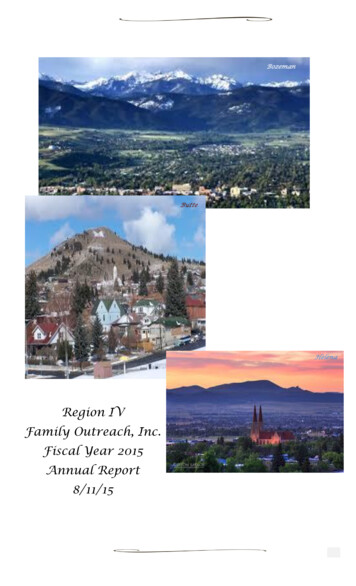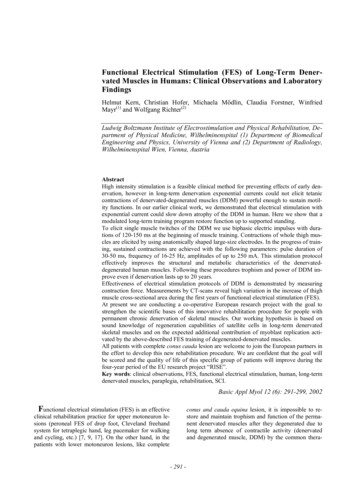
Transcription
Briefing Paper for FES-Clingendael seminarJan Marinus Wiersma, Michiel LuiningSocial Europe at a crossroadsBy promising a ‘social triple A’ the Juncker Commission has put social Europe high on the agenda. Itscommitment formulated in this way should be considered as a reaction to growing criticism – andindeed resentment – in large parts of the population about the handling of the euro crisis. Promotinga more social Europe has become popular in many political circles. But what does that mean inpractice? Is there a European agenda shared by all member states? Do they have the same conceptof what it should be? Are they really prepared to hand over more competences to Brussels or cometo a consensus among themselves?We put these questions to experts from many parts of the European Union and published theiranswers in the European Union Social Europe section at Clingendael.nl (formerly at EUforum.nl).Their contributions partly form the basis of this briefing paper. We will briefly sketch the backgroundto the debate, its history and the different concepts and will then try to identify how the NorthSouth, East-West and EU member state balances/imbalances affect the ongoing development of asocial Europe. We will use the debate on the mobility package and on EMU – austerity and morecompetitiveness versus flexibility and fiscal capacity – to illustrate the different angles.BackgroundIn the past the European integration project could count on (relative) popular support and strongpolitical legitimacy as it showed results benefitting the national welfare states that Europeans pridethemselves on. There was and is a positive history of promoting social cohesion with generous EUfunding. European free-market integration became – and was sold as – the means to build and payfor growing prosperity. Social policies were secondary to that and the member states kept control oftheir own social security systems. The basic idea was that through economic integration the ECcountries would converge, which would also pay for more social cohesion within them. Despite pastsuccesses, this optimum was, however, never reached. On the contrary, since mid-2000 increasedinequality and economic imbalances have threatened the European project. It is no longer seen asthe protector of the national welfare state against the globalisation of the economy. Growth has notbeen the overall solution.Although unemployment figures in the EU have generally declined since 2013 and economic growthhas picked up modestly, youth unemployment remains high, social exclusion is still widespread andincome gaps between and within member states are widening. Many member states have not beenable to build or sustain sufficient social protection. There are new concerns about the sustainabilityof pension schemes caused by very low interest rates due to European Central Bank policies. Manyare calling for an end to – or demanding compensation for – the austerity measures and economicreforms mandated in the aftermath of the euro crisis, and not only in the debtor countries. Nationaldebates are focusing more and more on the question of how to preserve the social welfare stateamid anxieties concerning EU mobility and the refugees Europe is confronted with. This adds to theexisting distrust in the EU’s ability to deliver on social issues. The EU British membershiprenegotiation deal of last February implicitly assumed that Europe threatens the welfare state:restrictions on benefits for EU migrants were agreed upon if a member state can show that EUmigrants are putting excessive pressure on the functioning of its social services. Even though the dealas such is no longer valid, some inside the EU want this part to be implemented. Another new fact is
that the European Court of Justice has changed from an activist stance in granting social rights to arestrictive one.Where does this lead us? It is obvious that the reactions are different in Portugal or the UK: in Lisbonthey want more support from the EU; in Britain they wanted to protect themselves against certainparts of EU legislation. Some say that with Britain gone it will be easier to move forward with socialEurope. That is to underestimate the divergent approaches to the issue and ignores the basic factthat the EU had only limited (and shared) competences. Some also complain that social Europe lacksvisibility and that it is not sufficiently underpinned by concrete positive examples.Europe’s responseOnly a few initiatives – relaunching the social dialogue, accelerating the Youth Employment Initiativeand creating the Investment Plan for Europe (EFSI/Juncker fund) – have so far been undertaken bythe European Commission (reiterated in the State of the Union Address of 2016). And it remains tobe seen whether member states are willing to go further and take up the Commission’s offer to assistthem in aligning their social policies after Brexit. Most prominently on the Brussels agenda now is theproposal of a European Pillar of Social Rights. Building upon the existing EU acquis, it would serve toguide national policies in a number of fields considered essential for well-functioning and fair labourmarkets and welfare systems, including rules on minimum wages and the protection of genderequality.Social Europe, however, is a container concept that has many different meanings and interpretations.It ranges from protecting and promoting the ‘European social model’ to the whole of specific socialpolicies introduced by the EU over the years. Some – mainly in North-Western Europe – want the EUto offer better protection of national systems, which should remain the core of social security inindividual member states. Others – to be found more in the South – call, on the contrary, for aEuropean role in financing common unemployment benefit schemes, for example. These visions arecompeting for priority in Brussels. The former is supported by the fact that the Treaties explicitlystate that social security is an exclusive national competence. The latter points out that,nevertheless, the internal market and the European Semester are forcing the EU to intervene directlyand indirectly in the social area, thereby setting precedents.Most social regulations of the EU are basically products of the internal market. Creating level playingfields was and is a very important goal in this area: with regard to working hours or safety at theworkplace and – more recently – tackling the negative impact of labour mobility. Besides theproposed European Pillar of Social Rights, the most recent important step by the EuropeanCommission was to proceed with the revision of the Postings of Workers directive, despite theopposition of 11 national parliaments that used the Yellow Card procedure in an attempt to block it.The European Semester, with its focus on ensuring national macroeconomic reforms and fiscallyresponsible budgets, has an impact on social policies of member states – with its country-specificrecommendations concerning budgets and socioeconomic adjustments. To compensate for that, theprevious Barroso Commission already included some social indicators in the European Semester,such as the rate of youth unemployment, long-term joblessness or changes in labour activity.The general diagnosis of the EUThe EU institutions formulated a way forward in their Five Presidents’ Report of June 2015 with thepromise to deliver a ‘social triple A’ to the EU. To achieve socioeconomic convergence, acomprehensive Banking Union with a European deposit guarantee scheme is deemed necessary, asare a fiscal capacity of the eurozone to absorb asymmetrical shocks and more attention toemployment and social indicators within EMU.
The report endorses the diagnosis that the current social and economic set-up cannot deliver on thesocial needs and desires of citizens. It particularly entails the vision that an incomplete monetaryunion creates social imbalances. Several economists and former EU commissioner for Employment,Social Affairs and Inclusion László Andor come to the conclusion that a consensus on a fiscal facility,to serve during a period of national reforms and to tackle asymmetric shocks, is necessary. Memberstates themselves lack the monetary instruments in a currency union to stimulate their economies.But flaws in the functioning of the internal market also need to be taken into account as suggestedabove. The free movement of labour has come under attack after the enlargements of 2004 and2007 because of the violations of the principle of ‘the same wage for the same job at the sameplace’. The (growing) income gaps, especially between East and West, have led to a huge increase inthe number of posted workers competing with labour in the richer member states. This createsdownward pressures often labelled as social dumping. The revision of the Posting of WorkersDirective within the mobility package of the European Commission addresses that.Moreover, there appears to be a proposal in the pipeline from Juncker to ask for more flexibilitywithin the current budgetary and fiscal rules, as has recently happened de facto with Spain, Portugaland France, for example. Excluding certain expenditures from the rules, such as education andresearch, has also been proposed, along with expenses incurred due to exceptional events such asthe refugee crisis or security threats.Perspectives across member statesMember states may want to pursue a social Europe, but not all member states have respondedenthusiastically to the EU’s proposals: because they do not serve their direct interest, they have adifferent diagnosis or they have other priorities or favour setting additional requirements beforesuch measures can be implemented. There seem to be divergent perspectives on what is consideredsocial, and politically feasible. These differences appear to revolve around at least three dimensions.1. Enforcing, revising or complementing the EU’s current economic governance rationaleAs regards the future of EMU and the European Semester, a fierce debate is raging showing a NorthSouth divide. Creditor countries such as Germany and the Netherlands, which have no problem withthe 3% budget deficit and 60% GDP debt rules, oppose too much flexibility with regard to the budgetand want the countries that have difficulty meeting the criteria to continue reforming their – lesscompetitive – economies. They want a stricter and more straightforward implementation of theEuropean Semester, without adding more indicators that leave room for manoeuvre. Germany seesitself as a role model and both Berlin and The Hague oppose a transfer union.In the South of the EU one hears a different story. In Greece they want to get rid of the FiscalCompact, and alongside France and Italy there is broad support for more flexibility in implementingthe Growth and Stability Pact. The eurozone should introduce a fiscal capacity as an asymmetricshock absorber and develop a common unemployment benefit system. This capacity could take theform of a European unemployment security scheme as already proposed by the Slovak Presidencyand which can count on support in Portugal and Italy. France favours the principle but has notindicated clearly in which form.2. Strengthen the social dimension of the E(M)U or leave it to the member statesSocial indicators have already been introduced in the European Semester such as the rate of youthunemployment, long-term joblessness or changes in labour activity, but there is no agreement onwhether to go beyond that with more and more (binding) indicators. In Portugal one can find supportfor the latter and the European labour unions are demanding that social and environmental aspects
should be taken fully into account to correct the current economic governance. In Italy finding a newbalance is not a priority, but instead more political integration should be promoted as the way totackle social imbalances. Spain is divided and Germany shows no ambition for change. The Europeanbusiness community wants to avoid higher common standards. According to our expert contribution,Sweden, outside the eurozone, is calling for an agenda that goes beyond the European Semester. Thegeneral view in Poland is that the EU should concentrate on growth and not on new social initiatives.In the Netherlands many are hesitant about giving the EU a bigger say on social policies.3. Reinforcing or granting exceptions to the EU non-discrimination principle with regard tolabour mobilityThe free movement of people, in relation to labour and services, is under attack in a number ofmember states. The claims of EU migrants on social services in the countries where they haveestablished themselves have had the contrary effect of a stricter application of the rules concernedand even reductions in their entitlements. Rights to social welfare and child benefits are beingcurbed. This of course leads to critical reactions in their countries of origin – all over the EU.The controversial issue of posted workers has a strong East-versus-West aspect, since workers fromthe former communist member states benefit from the present arrangements in which they arecheaper than labour in the host countries because they pay their – much lower – social securitycontributions in their country of origin. One of the aims of the recent mobility package is to reversethis. An attempt by national parliaments mainly of the Eastern European countries to block theseproposals on subsidiarity grounds has been rejected by the European Commission and the battle willcontinue in the European Parliament and the Council of Ministers. What the richer countries considerto be unfair wage competition is seen in most new member states as a temporary advantage offeringextra jobs and higher incomes in order to catch up and develop a higher level of socioeconomicstandards in their own country. The latter point of view has some support from pro-market forcesand liberal parties in the older member states, but it is not the majority view there. The contributionson Clingendael.nl to this discussion illustrate these differences. One should, however, not forget thatapart from being an East-West issue, there is also the basic cross-border conflict between workersand employers.The actual consequence of introducing more strongly the principle of the same pay for the samework at the same workplace into the Posted Workers Directive would be a limitation of the mobilityof workers, thereby violating an important principle of EMU. Labour mobility should and could be animportant shock absorber within the monetary union – that is the official view of many EMUsupporters, particularly those opposed to a fiscal capacity (fiscal union). So there is a contradictoryelement in the whole debate. Finally, there remains the open question of whether posting workersabroad is actually the right business model for the poorer economies of the EU; whether there areother ways to catch up with the more developed economies.ConclusionGiven the divergent views on essential elements constituting social Europe, the introduction of majorchanges is unlikely. The support for the Five Presidents’ Report is neither unconditional nor universal.It does not offer immediate answers. As regards the EU’s economic governance in relation to anoverhaul of the European Semester, member states oppose one another in different directions: withmore binding social indicators or with stricter application of the present rules. Even though thedebate has a strong North-South dimension, it is also being waged within member states along a leftright divide, with populist parties opposing both reforms and the EU itself.
The EU lacks the legal instruments to promote a strong social agenda. This recalls the problem of theEurope 2020 ambition of reducing unemployment and tackling poverty: only soft instruments such asbenchmarking and voluntary coordination are available. Fear of unwanted interventions by Brusselsin the national area of social security and unwillingness to change the EU treaties are real obstaclesto altering that. In the absence of EU shock absorbers, the ECB has been giving breathing space to theweaker eurozone countries by pumping large amounts of money into their economies. But thedebate will continue. As the eurosceptics gain ground, partly through their attacks on current EUpolicies, they might force the more traditional parties in an opposite direction, demanding a strongcorrection of the EU’s market-oriented policies and a considerable strengthening of its socialdimension.It is conceivable that the various discussions on the E(M)U and labour mobility cannot be resolved inisolation, and that they need to be put into a larger socioeconomic context to overcome the existingdeadlock.
and creating the Investment Plan for Europe (EFSI/Juncker fund) - have so far been undertaken by the European Commission (reiterated in the State of the Union Address of 2016). And it remains to be seen whether member states are willing to go further and take up the Commissions offer to assist them in aligning their social policies after Brexit.










